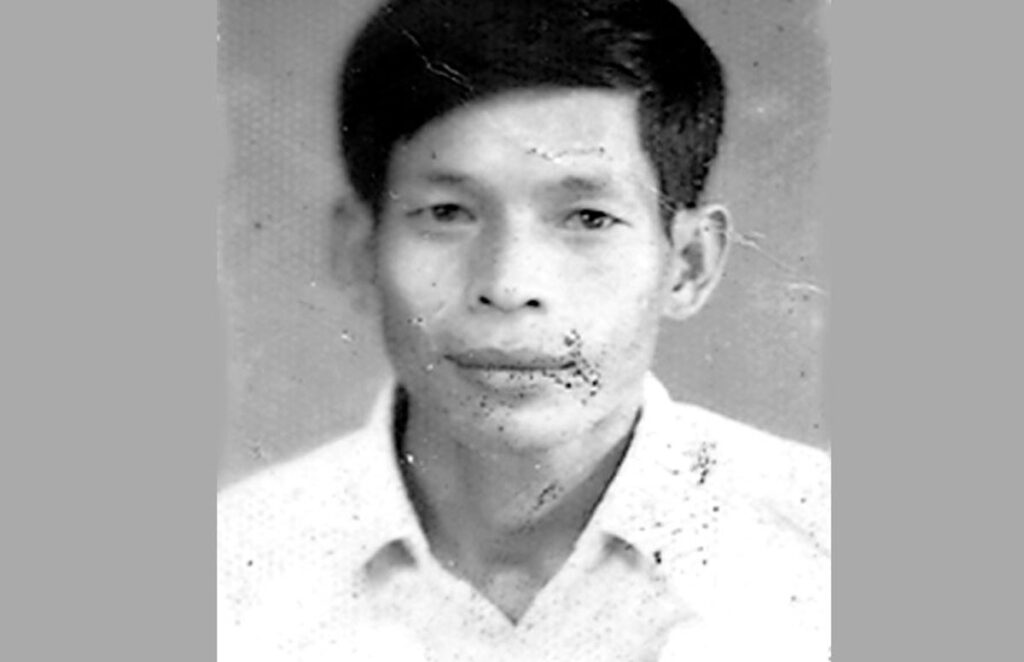My mother died when I was young and my father did not have enough money to support my education. So, I moved from Prey Vent Province to Phnom Penh where I lived with my brother-in-law Chann Kim Hor. He was a sergeant in the army and asked me to take the entrance exam to become a soldier. After I passed the exam, I had military training for seven months and then technical training in artillery. I chose to study at a heavy weapons unit of the Air Force.
After we finished training, the eight members of our group guarded King Sihanouk whenever he went to the provinces. Each man in the group had a big gun that was 37 mm long.
In 1967, after I captured a Khmer Rouge in Battambang Province, the King gave a medal and promoted me to work in Air Force Company 3, where I fought in many battles. Twice we were surrounded by Khmer Rouge soldiers and trapped for a week or more.
I married In Sai Muon in 1972. We met at An-Daung plantation when I took a battalion to fight at Chen La. We then moved to Phnom Penh, where my wife worked as a seamstress. Because I was a soldier, it was inevitable that I would be sent to the battlefield, so I transferred to the military police office in Phnom Penh.
In February 1975 I decided to separate from my wife and children for a while because of the political instability in the country. My wife wanted to be with her parents in Kampong Cham Province, and I wanted to escape to America through Thailand. I did not have enough money to buy plane tickets for her and our children; I only had enough to buy one for myself.
I left Phnom Penh and flew to Battambang Province, where I could find a connection that would allow me to get to Thailand. I told my wife and children that I would return once the country was more peaceful. However, when I reached Battambang, I decided to stay in Cambodia.
On April 15, 1975, the Khmer Rouge evacuated me to a village near the Thai border. They told people to register their names and occupations so they could go back to their old jobs. Some people said they were customs agents or military officers. However, I changed my name to Sokh Chhan and said I was a worker. The next day, the customs agents and soldiers were taken away in cars and never returned.
Although I wanted to ask for permission to visit my wife and children, the Angkar’s rules were very strict, so I did not dare. If I had returned to my home village, I would have been killed because I was a soldier.
I worked as an ox in the rice fields. Each work group had nine people; eight of us pulled plows like oxen and one person held the plow. At first, we had enough to eat, but later, the food diminished. So the Khmer Rouge would order 50 people to pull carts with 130 rice sacks on them from a village 20 kilometers away and bring them to Kok Ta Sat.
The Angkar often transferred me to work in other villages after harvesting time. I carried both paddy and husked rice from the mill to the granary. Bong, who worked in the same rice mill, was accused of being a Vietnamese and sent to be killed. Two days later, the Angkar took Bong’s wife and children to be killed as well. Bong could speak Vietnamese, but he was a Khmer.
One day, a cadre who worked in cooperative brought two ducklings for me to raise. He promised that when the ducks produced eggs, he would share them with me. However, when the ducks grew up, a new chief was transferred to the granary. The cadre wanted his ducks back, but I couldn’t give them to him because everything was controlled by the new chief. So the cadre accused me of stealing his ducks. The same afternoon, the Khmer Rouge brought me to the Commerce Office, where they accused me of being an imperialist. I couldn’t contradict them; I only prayed. They beat me until I lost consciousness for a whole day. My body was covered with blood. Then, the Angkar sent me back to my unit. No one dared to talk to me any longer because I had made this mistake.
When the Vietnamese liberated Cambodia in 1979, I gathered people in the village to fight against the Khmer Rouge with sticks and knives. Then I went back to Kampong Cham to find my wife and children. However, the villagers there told me that my wife, her father and siblings, and our children had been killed by the Khmer Rouge. I looked for their corpses, but all I could find was a prison.

